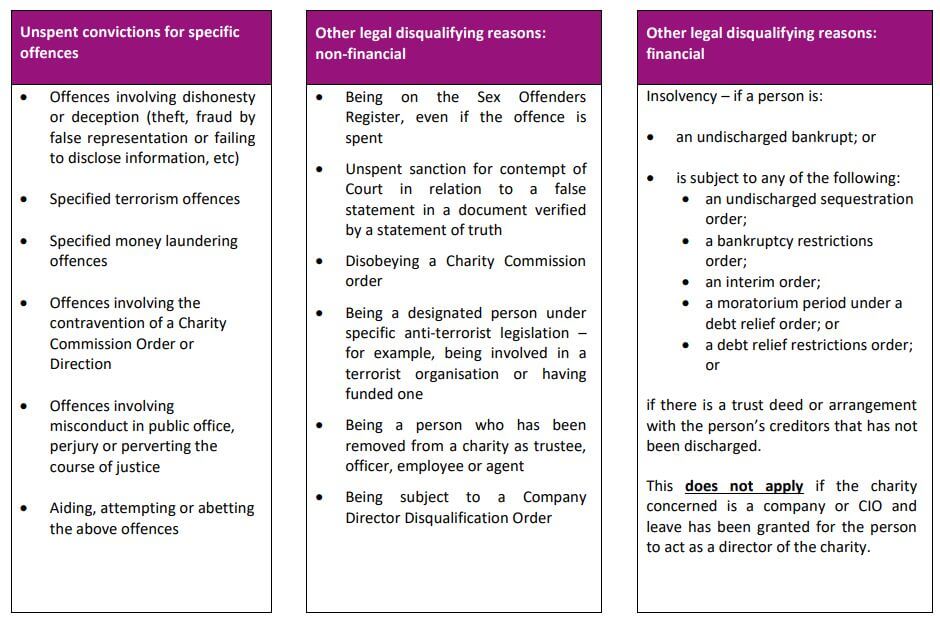Who Can Run Your Charity?
Who Can Run Your Charity?
New automatic disqualification rules for charity trustees and senior managers
With effect from 1 August 2018, the rules about automatic disqualification were updated and extended so that they apply to senior management positions in charities.
The rules have extended the grounds on which someone may be automatically disqualified from acting as a charity trustee. They now also apply to Chief Executive or Chief Finance Officer functions (or their equivalents).
Waivers continue to be available where the Charity Commission is satisfied that it is in the best interests of a charity to have someone with a relevant conviction on a charity’s board or in a senior management position.
The Commission has advised charities that they should have systems in place to check whether any trustees or senior managers are disqualified and that they should also know what steps to take before a disqualified trustee or manager can come back on board.
What are the grounds for automatic disqualification?

If a trustee or charity senior manager becomes disqualified, he or she must:
- cease acting immediately,
- bring the matter to the attention of the trustees of the charity, and
- if he or she is a trustee, resign formally from his or her position as a trustee so that it is clear that he or she is no longer part of the trustee body.
If the Charity Commission discovers that an individual is acting whilst disqualified, it can order the individual to repay any expenses, remuneration or other benefits received from the charity during the time in which he or she acted while disqualified. The Commission may also report the matter to the police.
These grounds do not prevent the individual from continuing to volunteer for and assist the charity outside these defined roles. However, where it is vital that a disqualified individual continues in his or her current role, charities should consider seeking a waiver from disqualification.
Waivers: what are they, and how do you apply?
Obtaining a waiver from the Charity Commission will usually be the best means of ensuring a trustee or senior management figure who is subject to automatic disqualification can continue to act for a charity. There are some circumstances where a waiver cannot be granted:
- where the charity is a company or CIO and the individual is disqualified as a company director, undischarged bankrupt, has failed to pay a county court administration order or has not been granted leave to act as director; and
- where the charity’s governing document prevents the individual from acting as trustee or in a senior management position.
Waiver applications can be made online and the Charity Commission will make a formal decision based on the information provided. Each application is considered on its own merits. Waivers can even be granted automatically where an individual has previously been removed from a position within the charity by the Commission and over five years have passed since their removal (provided that none of the exceptions above apply).
Once obtained, a waiver brings a person’s disqualification to an end, in relation either to the specific charity, to a certain class of charities (where, for example, they share similar objects) or to all charities generally.
What should charities do now?
Active steps a charity can take include:
- asking all current trustees and senior managers to confirm that their entitlement to act is not affected by these changes;
- updating any form that new trustees are asked to sign before acting, so that they take account of the changes to the rules; and
- updating the charity’s policies and processes for checking whether new appointees are eligible to join; these processes could include checking candidates against publicly available registers such as the Individual Insolvency Register, Companies House and the Commission’s register of persons who have been removed as a charity trustee.
The updated rules about disqualification and waivers can be complicated and can put further pressure on a charity looking to appoint new trustees and managers. If you would like help regarding the new disqualification rules or with seeking a waiver, please contact us on 01895 207862 or email charities@ibblaw.co.uk.
